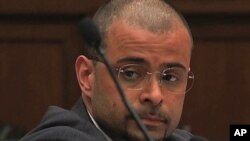In the United States, most people convicted of serious crimes cannot vote while in prison, and many are denied the right to vote even after they are released. Lawmakers in Washington are considering a bill that would ease voting restrictions on former felons. The debate centers on the question of whether criminals deserve a second chance.
Marcus Martin spent more than 11 years in prison after being convicted of assault. He was released in December, and now works at his father's insurance and bail bonds company. He wants his right to vote back.
"Whatever rights that a normal citizen should have, I believe I should have it as well, since I've served my time and I'm back in society as a paying taxpayer, a community activist, or a person," said Martin.
Based on Maryland state law, Martin cannot vote until his parole is up in 2020. He says that's not fair.
"Whether it's gay marriage, whether it's making changes in the community or making changes on a broad scale - if I'm a citizen of the United States, it affects me as well," he added.
Civil rights groups say more than five million people are denied the right to vote in the United States because of past felony convictions.
Laws vary by state, so U.S. House of Representatives is considering a bill that would allow all former prisoners to vote in federal elections after they have completed their sentences.
Andres Idarraga is a Yale University law student, a rights activist and a convicted felon. He testified recently before Congressional subcommittee.
"Exclusion is at the end of a complicated chain that often begins with poverty and the lack of education, involves the criminal justice system, the penal institution and often ends in isolation, bitterness and disfranchisement," Idarraga noted. "I have personally traveled this complicated chain from beginning to end."
Idarraga spent more than six years in prison on a drug conviction. He says he gained a new perspective on citizenship in the prison library.
"Voting is particularly important because when we exclude people from voting - we're excluding them from the fundamental act of what it means to be a citizen," Idarraga added.
But opponents of the bill argue that not all criminals deserve a second chance. Roger Clegg leads a conservative policy group called the Center for Equal Opportunity.
"The right to vote should be restored carefully on a case by case basis after the person has shown that he or she has taken a new direction in his or her life," said Clegg. "Somebody like Andres [Idarraga], I think, can show that. But a lot of people can't."
Marcus Martin admits he made mistakes, but he says his time in prison actually made him a better citizen.
"One thing I've learned over life is that you don't really know what pain is or joy is until you experience the other," he said. "I honestly believe that you don't really understand what freedom is until you've had that freedom taken away."




